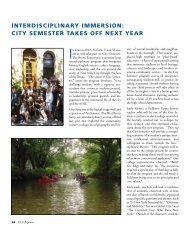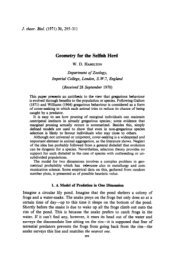Chapter 6 - Ethical Culture Fieldston School
Chapter 6 - Ethical Culture Fieldston School
Chapter 6 - Ethical Culture Fieldston School
You also want an ePaper? Increase the reach of your titles
YUMPU automatically turns print PDFs into web optimized ePapers that Google loves.
“Mr. Sinatra Gets Rejected”<br />
There was absolute silence – stunning, absolute silence.” Sinatra looked at pianist<br />
Skitch Henderson, whose face was white with fear. “Finally I turned to the<br />
audience and whispered into the microphone ‘Good night,’ and walked off the<br />
floor.” 27 The problem was attributed to bleeding in Sinatra’s vocal chords. He<br />
canceled the rest of the engagement to regain his voice, and did. But there was a<br />
serious question about how much that mattered. For in the eyes of many<br />
observers – and even Sinatra himself – his career was finished.<br />
The stages of Sinatra’s fall from commercial grace seem to have occurred<br />
as imperceptibly as his meteoric rise. To all outward appearances, he was still at<br />
his peak in 1945, when The House I Live In was released and he was the lead star<br />
(with higher billing than Gene Kelly) in Anchors Aweigh. In addition to his<br />
Academy Award for House in 1946, he enjoyed a string of top ten hits that year,<br />
and was named “America’s Favorite Male Singer” in Downbeat magazine.<br />
Still, there were signs of slippage. In 1945 Sinatra was dropped from Your<br />
Hit Parade; although he had come to hate the drudgery of hosting the radio<br />
program, he found it doubly irritating to be replaced by opera star Lawrence<br />
Tribbett. 28 He returned to the show in 1947, but by that point his output of hit<br />
singles had noticeably declined to one that year (“Mam’selle”) and none in 1948.<br />
Meanwhile, a new group of singers like Frankie Laine and Johnny Ray were<br />
attracting attention that had generally been Sinatra’s five years before. And while<br />
some of his movies – notably Take Me Out to the Ball Game (1949), another musical<br />
with Kelly – continued to perform at the box office, most of his films in the<br />
second half of the decade were regarded as middling at best by critics and<br />
moviegoers. By the time of his Copacabana engagement in 1950, there was an<br />
27 Nancy Sinatra, My Father, p. 73. “I thought for a fleeting moment that the unexpected pantomime was a<br />
joke,” Henderson is quoted by Kitty Kelly as saying without attributing a source. “But then he caught my<br />
eye. I guess the color drained out of my face when I saw the panic in his.” (His Way, pp. 165-166).<br />
American History for Cynical Beginners<br />
24
















